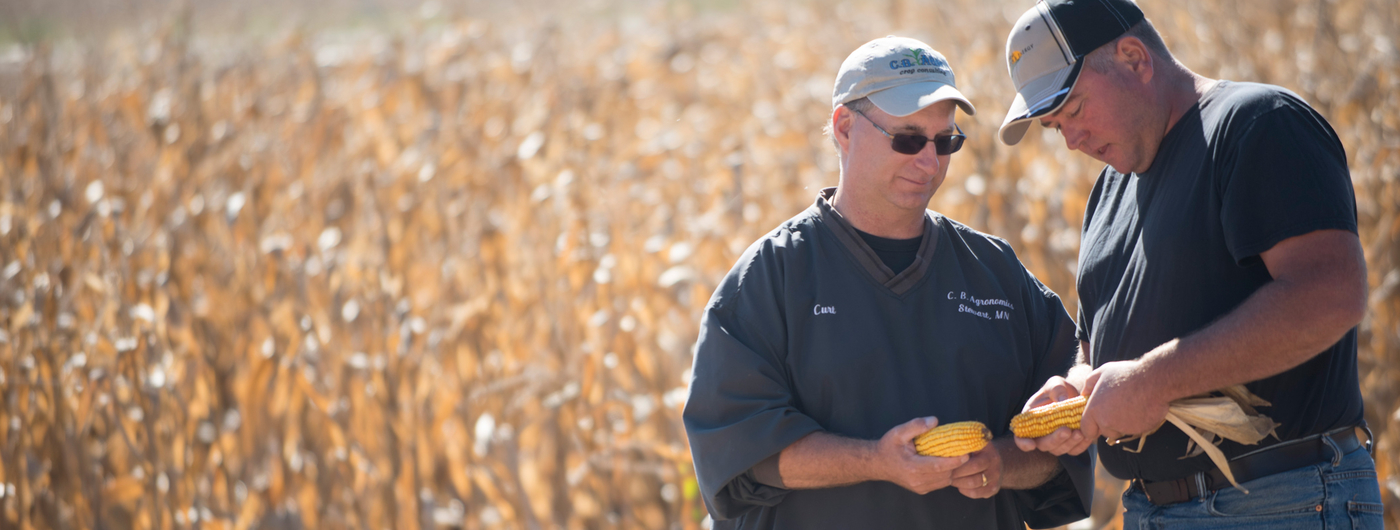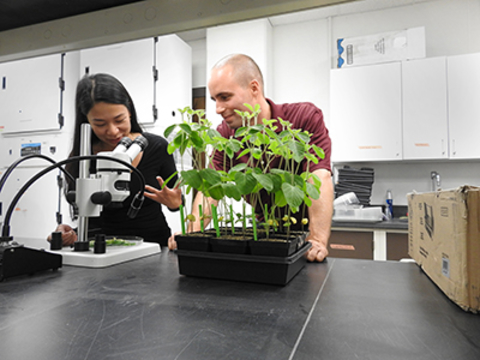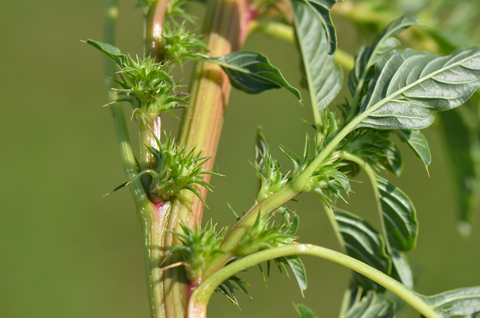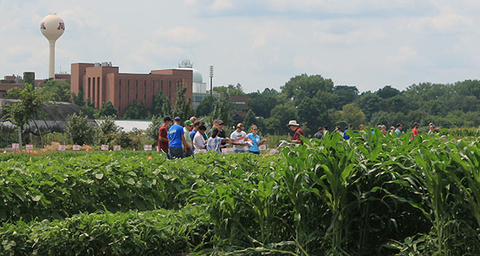Improving agriculture together
For nearly 30 years, Extension has shared the University’s research with certified crop consultants like Curt Burns (left). Through educational field days and other workshops, consultants and other ag professionals stay up to date on complex topics so they can help farmers like Robb Schwarzrock make decisions that improve crops and conserve natural resources.
Extension’s model of engagement brings knowledge to farmers through crop consultants, and back again.
When Sibley County farmer Robb Schwarzrock makes sound decisions this season for his family’s farm, he’ll be using research from University of Minnesota Extension. That research helps Schwarzrock at a time when the prices he receives for his crops are low and profit margins are tight.
Schwarzrock gets much of his information through Curt Burns, a University of Minnesota alumnus and Extension-trained certified crop consultant. Professionals like Burns reach 52 farm clients on average each, affecting 6.6 million acres of land. “It’s about the whole gamut from seed, to fertilizer, to crop protection products,” says Burns. “Research from the University of Minnesota gives farmers the information they need to purchase inputs that will work on their farm as they should,” he adds. “Farmers need to spend their dollars wisely.”
Lance Otto, executive director of the Minnesota Independent Crop Consultants Association, says farmers use the information to protect natural resources, such as water and pollinators. “Farmers want to pass along their farm to the next generation of their family and using unbiased research helps them make decisions that are in the best interest of their family and the land.”
Burns agrees. “Ecology continues to evolve and we need the agricultural research that will allow farmers to adapt,” he says.
Eyes in the field
Bob Koch, Extension entomologist, works closely with farmers to study crop pests. He is pictured with graduate student Anh Tran, who assists in his research lab.
The information flows both ways. Bob Koch, Extension entomologist, relies on producers and crop consultants to let him know what’s happening in their fields. Koch’s research focuses on improving the environmental and economic sustainability of soybean production by controlling soybean aphids, which can inflict serious economic losses to farmers.
Koch started hearing about aphid resistance to some insecticides from growers and pesticide applicators in 2015. He began collecting aphids from those fields and documented the resistance in his lab.
“We’re uncertain how it’s going to play out,” says Koch. “Aphids have a complicated life cycle and biology, and they move around a lot.” Aphid control recommendations have a big role in Extension’s winter meetings with farmers and crop consultants like Burns.
Controlling insect pests is not only an economic issue. “If a farmer is overusing these products or applying them when the population of aphids doesn’t warrant it, it puts more pressure on the pest to develop resistance,” says Koch. Communication through crop consultants and other agricultural professionals helps producers understand control methods and use pesticides responsibly.
Interpreting complex data
Varietal selection, fertility, seeding rates and weed control are other issues that require producers to make tough decisions. Schwarzrock believes having the opportunity to bounce options off someone like Burns is valuable.
Those decisions are becoming more complex as farm technology advances. The amount of data now available to producers can be overwhelming. Precision agriculture, including the use of yield monitors and Global Positioning Systems to collect complex information from a crop field, can improve farming practices, but for many producers there is a learning curve. Extension trains agricultural professionals so they can be there to help on Minnesota’s farms.
“I can’t keep up with it,” says Schwarzrock. “We rely on people like Curt for all this; I know Curt’s going to help me. It’s not even a worry of mine.”
Impeding invaders
Extension’s model of engagement was demonstrated again during the summer of 2016. A crop consultant contacted an Extension specialist to report suspected Palmer amaranth on a farm in Yellow Medicine County. The specialist made an initial identification, and the University and the Minnesota Department of Agriculture confirmed the finding. Extension, its partners and crop consultants are educating growers on necessary action.
“Palmer amaranth infestations have caused substantial yield losses and greatly increased weed management costs in cotton, soybeans and corn in the southern states,” said Jeff Gunsolus, Extension agronomist. “This is a disconcerting, though not completely unexpected, discovery in Minnesota. We have been discussing proper identification procedures with crop consultants during our Institute for Ag Professionals educational programs over the last three or more years.”
Teaching the next generation of agricultural professionals
Extension educates the people who have the most influence on farmer decisions: agricultural professionals, including crop consultants, seed and fertilizer salespeople, and pest management professionals. Each year, they come to an on-campus Field School through the Institute for Ag Professionals.
“We’re adapting how we teach to meet the needs of the new generation of ag pros that is stepping up,” says Ryan Miller, Extension educator. Miller has worked with other Extension educators like Lisa Behnken and Brad Carlson to use hands-on learning, videos and other digital and interactive educational technologies to create a pipeline of new professionals and stem the shortage of people qualified to lead in the industry.
Related stories
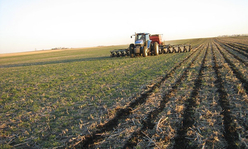
Minnesota farmers share sustainable practices
Online database helps farmers share their experiences with sustainable farming methods.
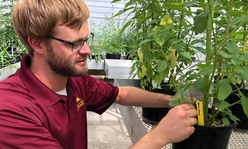
Q and A with Jared Goplen
Hear from an AGREETT-funded Extension crops educator.


